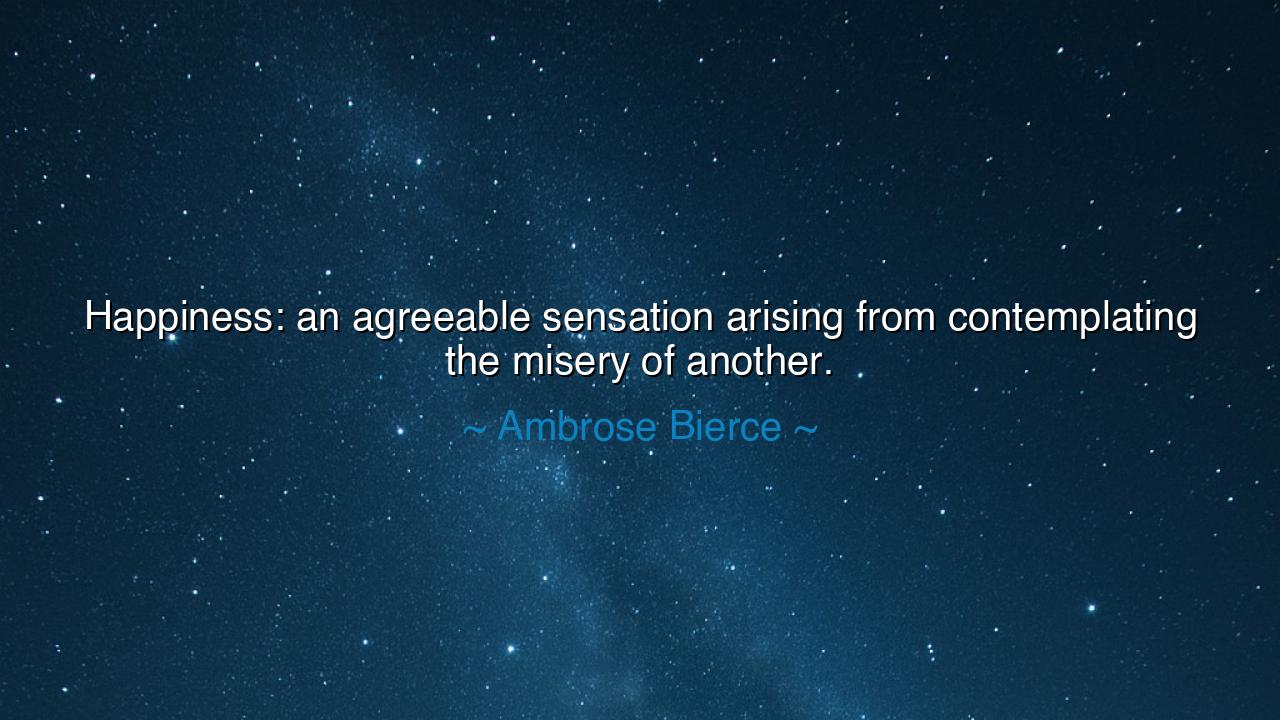
Happiness: an agreeable sensation arising from contemplating the






The American writer Ambrose Bierce, whose tongue was as sharp as a blade and whose mind burned with irony, once defined happiness as: “An agreeable sensation arising from contemplating the misery of another.” At first glance, these words sting like venom, for they mock the noblest of human emotions. Yet behind the bitterness of the phrase lies a piercing truth about human nature—a truth that Bierce, who lived through war and disillusionment, saw too clearly to ignore. His words are not an endorsement of cruelty, but a mirror held before mankind, reflecting the darker corners of the soul where envy, pride, and the hunger for superiority still dwell.
Born in the nineteenth century, Bierce was a soldier before he was a writer. He marched through the blood and horror of the American Civil War and witnessed firsthand how frail the masks of virtue can be when tested by suffering. His definition of happiness, taken from The Devil’s Dictionary, was not a jest of mere cynicism—it was born from what he had seen: that even in times of peace, men often draw quiet pleasure from the downfall or pain of others. He observed the hypocrisy of the human heart—the way it smiles when rivals stumble, the way it finds relief in knowing another bears a heavier burden. Such is the moral irony of life: that some find comfort not in their own joy, but in another’s sorrow.
Bierce’s words are the echo of a deeper philosophy—one that exposes the shadow within the light. In every age, the wise have warned that envy is the secret thief of peace. To compare oneself to others is to forge invisible chains, for in doing so we measure our worth not by virtue or truth, but by victory over another’s misfortune. The heart that delights in such comparison may know fleeting satisfaction, but never true happiness. Bierce, through his sardonic humor, teaches that this form of happiness is hollow—a false fire that glows bright but burns nothing. It is the happiness of pride, the pleasure of the small-minded, the contentment of those who cannot yet rejoice in goodness for its own sake.
We see this shadow of schadenfreude, as the Germans named it, woven through history and the human story. Consider the tale of Marie Antoinette, the queen of France, brought low by revolution. When her fortune turned to ruin, the same crowds who once cheered her carriage through Paris now howled for her death. The people, long oppressed, found a dark delight in her fall. Their happiness came not from justice, but from vengeance—the intoxicating feeling of power over one who had once ruled them. Yet what followed was not liberation, but more suffering. For as Bierce implies, happiness that feeds on misery poisons those who taste it.
And yet, this quote, bleak as it sounds, carries within it a silent plea—a challenge to rise above the base instincts that dwell in every human heart. To see this truth is not to despair, but to awaken. For once we recognize this shadow within us, we can choose differently. We can learn to rejoice not in another’s loss, but in their strength; not in their sorrow, but in their joy. True happiness, the kind untouched by bitterness, arises not from comparison but from compassion—the ability to see another’s pain and seek to ease it, rather than take comfort in it. Bierce’s cynical mirror thus becomes a teacher: by revealing the worst in us, it invites us to become better.
To live by this wisdom is to guard the heart against envy and the mind against mockery. When you find yourself smiling at another’s failure, pause and look inward. Ask: Why does this please me? For the soul that rejoices in the fall of others will one day find itself alone when it falls. Instead, cultivate empathy as an antidote to arrogance. Practice gratitude, so that your joy springs from your own life, not from comparison. Seek not to outshine others, but to light the way beside them. The wise understand that all men share the same fate: joy and sorrow are companions to all who live.
So, my children, remember the lesson of Ambrose Bierce, the dark philosopher who taught through irony what others preach through praise. He showed that if we find happiness in another’s suffering, our joy is a fragile illusion, one that will crumble beneath the weight of conscience. Let us instead build our happiness upon higher ground—upon understanding, generosity, and inner peace. Let us turn from the false delight of judgment to the enduring light of compassion.
For in the end, the truest happiness is not an “agreeable sensation,” but a harmony of the soul. It is born not from contemplating misery, but from healing it. And when we learn to take joy in the goodness and triumphs of others, we will find that no shadow of bitterness can touch us—for we will have learned the ancient art of love, which alone can make the heart truly free.






AAdministratorAdministrator
Welcome, honored guests. Please leave a comment, we will respond soon